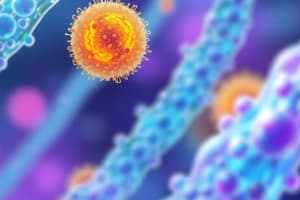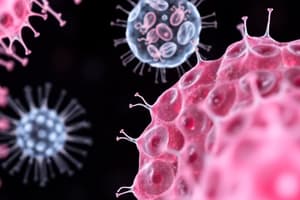Podcast
Questions and Answers
What role do bacteria play in relation to vitamins?
What role do bacteria play in relation to vitamins?
- They convert vitamins into waste.
- They produce vitamins. (correct)
- They inhibit vitamin absorption.
- They degrade vitamins in the body.
How do bacteria contribute to waste management?
How do bacteria contribute to waste management?
- They block the growth of other decomposers.
- They prevent decomposition of waste materials.
- They transform waste into energy.
- They eliminate waste by using it as food. (correct)
In what way do bacteria assist in maintaining our atmosphere?
In what way do bacteria assist in maintaining our atmosphere?
- They absorb carbon dioxide.
- They increase air pollution.
- They produce oxygen. (correct)
- They create harmful gases.
Which of the following statements about bacteria is false?
Which of the following statements about bacteria is false?
What is one of the amazing things bacteria can do?
What is one of the amazing things bacteria can do?
What type of cells are prokaryotes?
What type of cells are prokaryotes?
What is a key structural feature of prokaryotic cells?
What is a key structural feature of prokaryotic cells?
How do prokaryotic cells compare in size to eukaryotic cells?
How do prokaryotic cells compare in size to eukaryotic cells?
Which of the following is true about prokaryotes?
Which of the following is true about prokaryotes?
Which example represents prokaryotic organisms?
Which example represents prokaryotic organisms?
Study Notes
Prokaryotes
- Prokaryotes do not have a nucleus
- Prokaryotes do not have membrane-bound organelles
- Prokaryotes only contain ribosomes
- All prokaryotes are unicellular
- Prokaryotes are smaller than eukaryotic cells
- Prokaryotes are the forerunner to eukaryotic cells
- Prokaryote DNA is single-stranded and circular
- All bacteria are prokaryotes
Eukaryotes
- Virology: the study of viruses and virions
- Mycology: the study of fungi
- Phycology: The study of algae
- Protozoology: the study of protozoa
Immunology
- Immunology is the science that deals with the host and parasite relationship
- Immunology examines the response of the host to a foreign body
Antonie Van Leeuwenhoek
- Antonie van Leeuwenhoek lived from 1632 to 1723
Joseph Lister
- Joseph Lister lived from 1823 to 1912
- Lister discovered antiseptics in 1867
John Tyndall
- Tyndall's work was important in the development of the germ theory of disease
- Tyndall's work helped to understand the nature of microbial growth and the role of microorganisms in disease
Louis Pasteur
- Louis Pasteur lived from 1822 to 1895
- Louis Pasteur is known as the "Father of Microbiology"
- Louis Pasteur disproved the theory of spontaneous generation
- Louis Pasteur developed pasteurization, a process used to kill bacteria in liquids
- Louis Pasteur discovered the role of microorganisms in fermentation
- Louis Pasteur developed vaccines for anthrax and rabies
- Louis Pasteur studied anaerobic organisms
Robert Koch
- Robert Koch lived from 1843 to 1910
- Robert Koch identified the bacteria responsible for anthrax, cholera, and tuberculosis
- Robert Koch developed Koch's postulates, a set of criteria used to determine the causative agent of a disease
- Robert Koch won the Nobel Prize in Physiology and Medicine in 1905
Studying That Suits You
Use AI to generate personalized quizzes and flashcards to suit your learning preferences.
Related Documents
Description
Explore the fundamental differences between prokaryotes and eukaryotes in this quiz. Learn about cellular structure, historical figures in microbiology like Antonie van Leeuwenhoek and Joseph Lister, and the fields of study within microbiology and immunology. Test your knowledge on these essential biological concepts and contributions.




